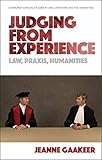Judging from Experience : Law, Praxis, Humanities / Jeanne Gaakeer.
Material type: TextSeries: Edinburgh Critical Studies in Law, Literature and the HumanitiesPublisher: Edinburgh : Edinburgh University Press, [2022]Copyright date: ©2019Description: 1 online resource (320 p.) : 2 B/W illustrationsContent type:
TextSeries: Edinburgh Critical Studies in Law, Literature and the HumanitiesPublisher: Edinburgh : Edinburgh University Press, [2022]Copyright date: ©2019Description: 1 online resource (320 p.) : 2 B/W illustrationsContent type: - 9781474442503
- 340.1
- online - DeGruyter
| Item type | Current library | Call number | URL | Status | Notes | Barcode | |
|---|---|---|---|---|---|---|---|
 eBook
eBook
|
Biblioteca "Angelicum" Pont. Univ. S.Tommaso d'Aquino Nuvola online | online - DeGruyter (Browse shelf(Opens below)) | Online access | Not for loan (Accesso limitato) | Accesso per gli utenti autorizzati / Access for authorized users | (dgr)9781474442503 |
Browsing Biblioteca "Angelicum" Pont. Univ. S.Tommaso d'Aquino shelves, Shelving location: Nuvola online Close shelf browser (Hides shelf browser)

|

|

|

|

|

|

|
||
| online - DeGruyter Building Early Modern Edinburgh : A Social History of Craftwork and Incorporation / | online - DeGruyter Annals of the Parish / | online - DeGruyter Presidential Privilege and the Freedom of Information Act / | online - DeGruyter Judging from Experience : Law, Praxis, Humanities / | online - DeGruyter Dialect Writing and the North of England / | online - DeGruyter The Constructivist Turn in Political Representation / | online - DeGruyter The Other Hollywood Renaissance / |
Frontmatter -- Contents -- Acknowledgements -- Introduction -- Part I The Enchantment of Knowledge: Fact and Fiction in Law and Literature -- 1 The Enchantment of Knowledge and its Apotheosis: Gustave Flaubert’s Bouvard and Pécuchet -- 2 A Raid on the Inarticulate -- 3 Explanation or Understanding: Language and Interdisciplinarity -- 4 Understanding Fact and Fiction in Robert Musil’s The Man without Qualities -- 5 Poetry that Does not Fade: Gerrit Achterberg’s Experience with Law and Forensic Psychiatry -- Part II Iuris Prudentia or Insightful Knowledge of Law -- 6 Practical Knowledge: Facts, Norms and Phronèsis -- 7 Metaphor and (Dis)belief -- 8 Narrative Intelligence: Empathy, Mimesis and the Equitable -- 9 Towards a Legal Narratology I: Probability, Fidelity and Plot -- 10 Towards a Legal Narratology II: Implications and Pathologies -- Part III The Perplexity of Judges -- 11 Empathy Revisited: Who’s in Narrative Control? -- 12 Person and Poiesis in Technology and Law: Questioning Builds a Way -- 13 Control, Alt, Delete? Information Technology and the Human -- Coda -- Bibliography -- Index
restricted access online access with authorization star
http://purl.org/coar/access_right/c_16ec
A unique application of philosophical hermeneutics, literary theory and narratology to the practice of judgingCombining her expertise in legal theory and her judicial practice in criminal law in a Court of Appeal, Jeanne Gaakeer explores the intertwinement of legal theory and practice to develop a humanities-inspired methodology for both the academic interdisciplinary study of law and literature and for legal practice.This volume addresses judgment and interpretation as a central concern within the field of law, literature and humanities. It is not only a study of law as praxis that combines academic legal theory with judicial practice, but proposes both as central to humanistic jurisprudence and as a training in the conduct of public life. Drawing extensively on philosophical and legal scholarship and through analysis of literary works, Gaakeer proposes a perspective on law as part of the humanities that will inspire legal professionals, scholars and advanced students of law alike.Key FeaturesFocuses on the importance of judging for the humanities Combines legal theory and legal practice to show the importance of the bond of theory and practice in law and legal theory Incorporates the findings of philosophical hermeneutics and narratology for our continued thought on the position of law and literature, and law and the humanities as interdisciplinary movementsCreates philosophical–hermeneutical building blocks for a methodology for the humanistic study of law as praxisReflects on interdisciplinarity in legal studies against a backdrop of the tension between the natural sciences and the humanitiesLiterary case studies include: Gustave Flaubert’s Bouvard and PécuchetRobert Musil’s The Man without QualitiesDutch poet Gerrit Achterberg’s asylum poemsPat Barker’s RegenerationJohn Coetzee’s DisgraceIan McEwan’s The Children ActMichel Houellebecq’s AtomisedJuli Zeh’s The Method
Mode of access: Internet via World Wide Web.
In English.
Description based on online resource; title from PDF title page (publisher's Web site, viewed 29. Jun 2022)


